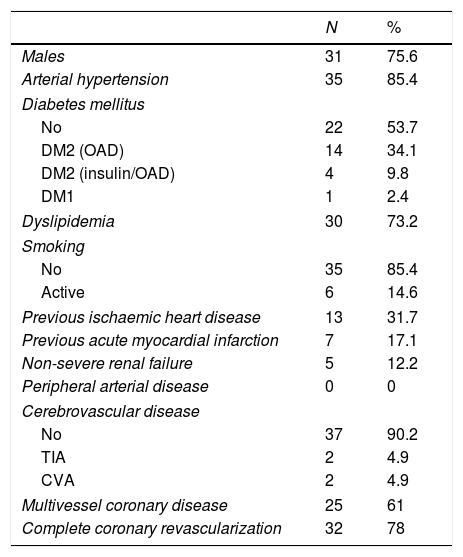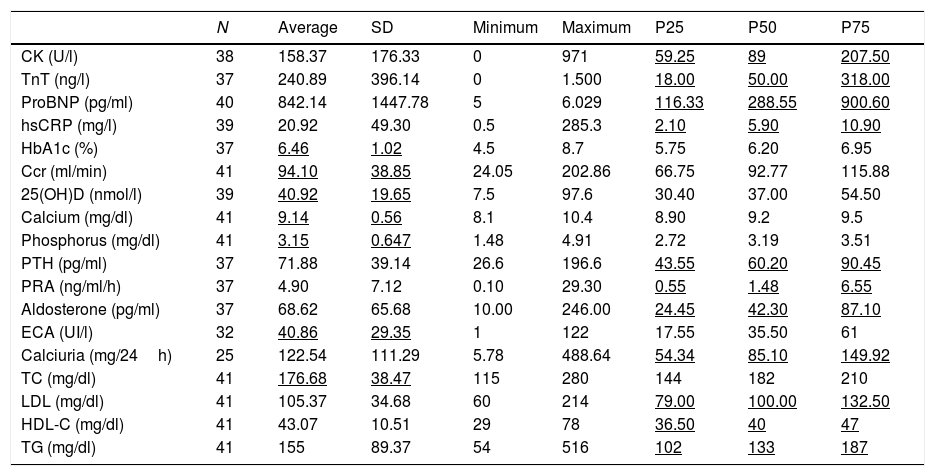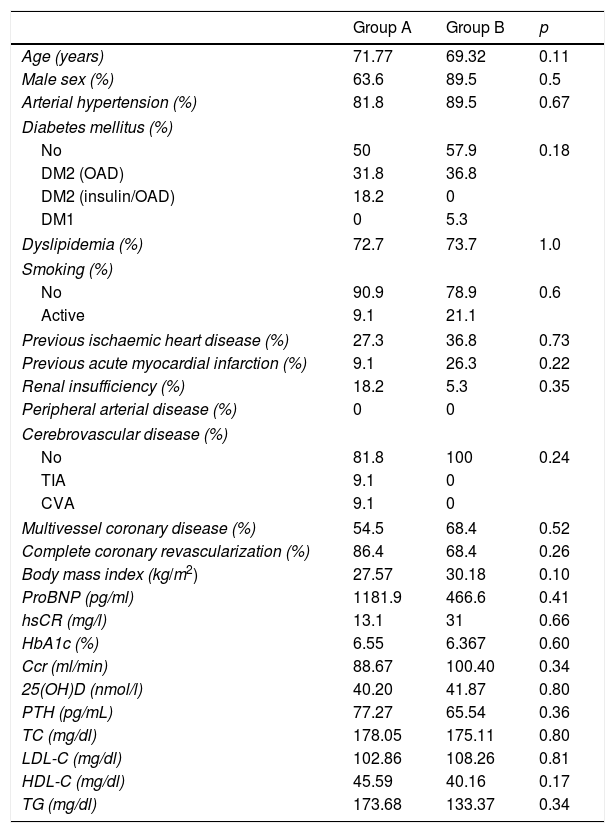Vitamin D deficiency has been consistently linked with cardiovascular diseases. However, results of intervention studies are contradictory. The aim of this study was to evaluate the effect of treatment with calcifediol (25(OH)D3) on the cardiovascular system of patients with non-ST-elevation acute coronary syndrome after percutaneous coronary intervention.
Patients and methodsA prospective study assessing ≥60-year-old patients with non-ST-elevation acute coronary syndrome, coronary artery disease and percutaneous revascularisation. We randomly assigned 41 patients (70.6±6.3 years) into 2 groups: Standard treatment+25(OH)D3 supplementation or standard treatment alone. Major adverse cardiovascular events (MACE) were evaluated at the conclusion of the 3-month follow-up period. 25(OH)D levels were analyzed with regard to other relevant analytical variables and coronary disease extent.
ResultsBasal levels of 25(OH)D≤50nmol/L were associated with multivessel coronary artery disease (RR: 2.6 [CI 95%:1.1–7.1], p=0.027) and 25(OH)D≤50nmol/L+parathormone ≥65pg/mL levels correlated with increased risk for MACE (RR: 4 [CI 95%: 1.1–21.8], p=0.04]. One MACE was detected in the supplemented group versus five in the control group (p=0.66). Among patients with 25(OH)D levels ≤50nmol/L at the end of the study, 28.6% had MACE versus 0% among patients with 25(OH)D>50nmol/L (RR: 1,4; p=0.037).
ConclusionsVitamin D deficiency plus secondary hyperparathyroidism may be an effective predictor of MACE. A trend throughout the follow up period towards a reduction in MACE among patients supplemented with 25(OH)D3 was detected. 25(OH)D levels≤50nmol/L at the end of the intervention period were significantly associated with an increased number of MACE, hence, 25(OH)D level normalization could improve cardiovascular health in addition to bone health.
El déficit de 25(OH)D se ha relacionado con un riesgo cardiovascular aumentado, aunque los estudios de intervención son contradictorios. El objetivo principal fue evaluar el efecto del tratamiento con calcifediol (25(OH)D3) sobre el sistema cardiovascular en pacientes con síndrome coronario agudo sin elevación de segmento ST.
Pacientes y métodoEstudio prospectivo que incluyó a 41 pacientes (70,6±6,3 años) ≥60 años con síndrome coronario agudo sin elevación de segmento ST y enfermedad coronaria revascularizada percutáneamente. Se aleatorizaron a recibir calcifediol+tratamiento habitual o tratamiento habitual exclusivo, con evaluación de major adverse cardiovascular events (MACE, «episodios cardiovasculares mayores adversos») a los 3 meses. Se estudió la 25(OH)D en relación con otras variables analíticas y con la extensión de la enfermedad coronaria.
ResultadosNiveles basales de 25(OH)D≤50nmol/l se asociaron a enfermedad coronaria multivaso (RR: 2,6 [IC 95%: 1,1–7,1], p=0,027) y 25(OH)D≤50nmol/l+paratohormona≥65pg/ml identificaron a pacientes con mayor riesgo de MACE (RR: 4 [IC 95%: 1,1-21,8], p=0,04). Se registró un MACE en el grupo de pacientes suplementados y 5 en el de tratamiento convencional (p=0,66). Entre los pacientes con niveles séricos de 25(OH)D≤50nmol/l al final del estudio el 28,6% presentaron MACE frente al 0% si los niveles eran>50nmol/l (RR: 1,4; p=0,037).
ConclusionesEl déficit de vitamina D que implica un hiperparatiroidismo secundario puede ser un buen predictor de MACE. En pacientes suplementados con calcifediol se observó una tendencia a la disminución de MACE en el seguimiento. Niveles finales de 25(OH)D≤50nmol/l se asociaron significativamente a un mayor número de MACE, por lo que la normalización de 25(OH)D, además de mejorar la salud ósea, puede mejorar la salud cardiovascular.












